Pete Rose’s Stats Endure, But So Does the Betrayal
No Hall Pass for Greatness Without Integrity

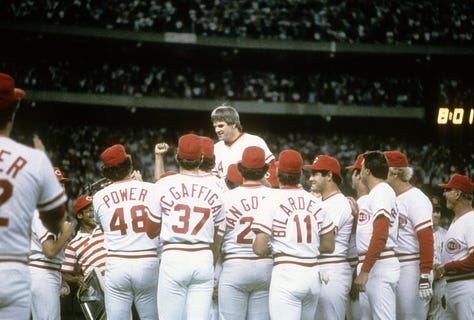
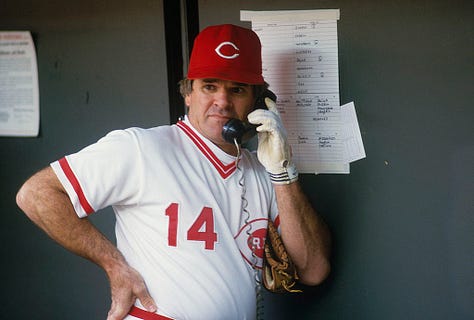
In a recent episode of our podcast Starkville, my co-host Jayson Stark posed a question following our discussion about Pete Rose and his Hall of Fame candidacy:
“Can we tell the story of baseball without the all-time hit leader, the all-time home run leader, or the pitcher with the most Cy Young awards?”
At the time, I gave only a brief response. But with MLB’s decision to change Rose’s permanent ban to a lifetime one, the moment calls for deeper reflection. Not only on Rose, Bonds, and Clemens, but on how we define greatness, honor, and legacy in this game.
Telling vs. Honoring
First, it is important to distinguish between telling the story and enshrining someone. Acknowledging a player’s impact is not the same as inducting them into the Hall of Fame. We must also be cautious about implying that these stories can only be told through a plaque in Cooperstown. Titles that contain words like “all-time” and “most” do not automatically entitle someone to that honor. Sharing someone’s story and honoring them with the sport’s highest institutional recognition are two fundamentally different acts, and we should not treat them interchangeably.
The National Baseball Hall of Fame and Museum exists for both purposes. The museum tells the full story of baseball—its players, teams, scandals, eras, and evolution. It’s where we document the game’s history in all its dimensions, including the blemishes and ethical failures. But the Hall of Fame proper should be reserved for those whose excellence on the field is matched by representing the game with honesty.
Players like Pete Rose, Barry Bonds, and Roger Clemens must be included in baseball’s story. Their stories reveal truths about the pressures, temptations, and failures within the sport. They belong in the museum, but not necessarily on a plaque. But in the end, the voters will decide that.
Baseball has long been driven by numbers: 500 home runs, 3,000 hits, 56-game hitting streak, 1.12 ERA. These incredible stats are often treated like achievements in a scavenger hunt, triggering automatic rewards. But these all-time record holders are revealing a crucial line between recognition and reverence. Hall of Fame enshrinement should not be just about tallying the highest number on a stat sheet. It should be about how those numbers were earned, and whether the player aligns with the best of baseball’s values of fairness, competition, sportsmanship, and respect for the game itself.
Just because someone shaped the game does not mean they upheld the standards the game strives to keep. And while we should not erase their place in baseball’s timeline, we also should not elevate them to a pedestal merely for their statistical dominance.
A Story Worth Telling, Not Idolizing
My short answer to Jayson’s question is still “yes.” We can tell the story of baseball without relying on numbers to replace the words—and it can be a rich, meaningful, and qualitative one. But I recognize that baseball is inseparable from its numbers, and without them, the story feels incomplete. Numbers help frame the stories of players, but baseball’s soul has never lived in its stats alone. There is a difference between breaking a record—earning your place through skill, persistence, and fair competition—and distorting history to glorify oneself.
Baseball existed before these players, and it will go on without them. But when records are tainted, the game is reduced to a kind of mythical tale, detached from authenticity with a lingering feeling of deception.
In the end, they left many fans disillusioned and in doubt when these idols of the game did not play fairly or treated the game like a commodity to be bought and sold. Perhaps their greatest contribution to our game is a warning, not a blueprint. Their chapters in baseball’s tale should not glorify, but caution. These are stories of heroes turned villains, of heroes who crossed the line, of greatness pursued at the expense of virtue. They compromised the very spirit that made it meaningful.
Pete Rose’s story differs slightly from those that juiced their way to the top. His numbers are not in dispute. By the numbers alone, he is among the game’s greats. Yet, in his pursuit of personal glory, he did not just tarnish his legacy, he compromised the very foundation of the game itself. As the Dowd Report made clear:
“Betting on baseball by a participant of the game is corrupt because it erodes and destroys the integrity of the game of baseball. Betting also exposes the game to the influence of forces who seek to control the game to their own ends. Betting on one's own team gives rise to the ultimate conflict of interest in which the individual player/bettor places his personal financial interest above the interests of the team.”
Rose made the values of baseball expendable and its fans the collateral damage. What he added in stats, he subtracted in trust.
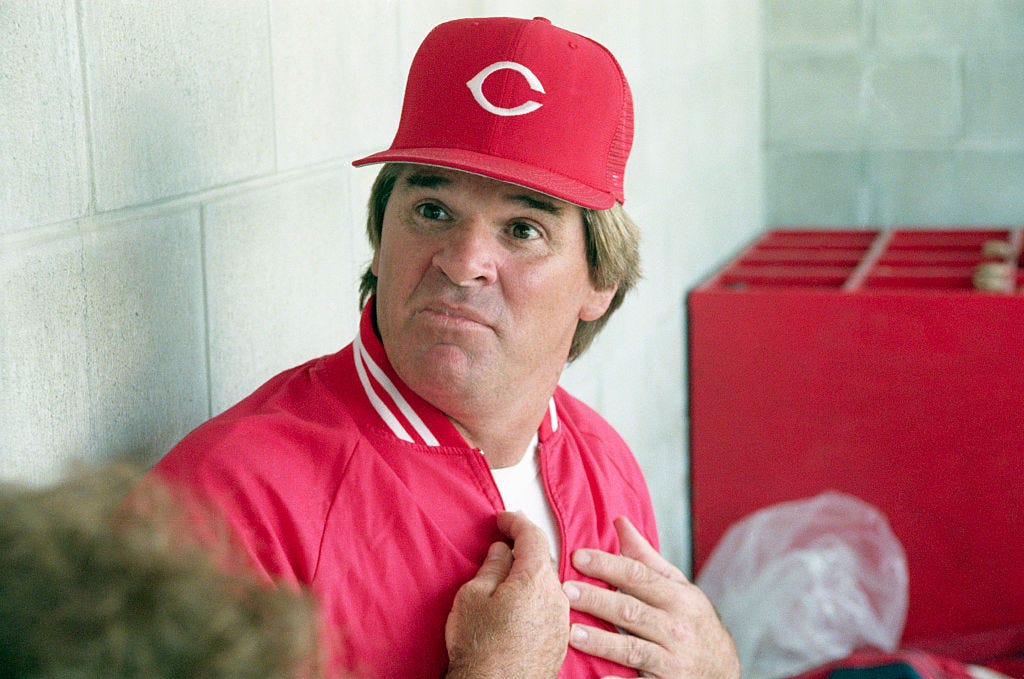
Integrity Over Immorality
Baseball must always be bigger than any one player, no matter their statistical achievements. I faced Hall of Famers like Tom Glavine or Greg Maddux. In the moment, they were not legends. They were opponents, competitors. I had to know Glavine could manipulate his changeup in countless ways and throw it in any count. I had to anticipate the moment when Maddux would come inside with his back-up slider to try and jam me, inducing weak contact. We understood they were great even then, but they were not encased in gold.
The spirit of fair competition is designed to level the playing field. No matter how lofty their stats, players were always given room to be human. And, too many players from my era were all too human—vulnerable to the insecurity, selfishness, and greed that can lure players to seek an edge by any means necessary, including performance-enhancing drugs (PEDs). No one should be surprised by what athletes in a high-performance environment might do to stay ahead. But just because it is not surprising does not mean it is not relevant to their individual legacy and baseball’s ongoing story of excellence. And certainly, it does not mean we should let the numbers obscure the truth or cause us to forget it.
This is not a business argument or an economic one. It is a soul argument. Every player has something to say. I played with Eddie Oropesa who defected from Cuba, leaving his family behind. One day before a game in Florida, after years apart, his entire family reunited in our dugout for Eddie’s major league debut. This included Eddie’s son, who had not met his father until he was three years old. That moment meant more than a thousand hits, and carried more emotional weight than any stat line.
And sometimes, you are just watching a Hall of Fame story that simply was not finished or was cut short by injury. That does not make it any less meaningful, nor should it be forgotten. Even players with brief careers captivate us. We ask, “How did that happen?” Because baseball flows with time, and the stories we choose to preserve shape its legacy.
The Stories We Have Erased
We have told the story of baseball for generations without its most unjustly excluded players. Those from the Negro Leagues. For decades we ignored the achievements of Josh Gibson, Satchel Paige, and countless others. Not because they did not matter, but because the power structures of the game, and society at large, refused to acknowledge them, let alone their numbers. These were players whose consequential achievements were not just omitted from official records, they were deliberately erased from the conversation. Their greatness was not counted, because the world refused to count them at all. So no, it is not difficult to imagine baseball without Pete Rose, Barry Bonds, or Roger Clemens. We told baseball’s story for decades while ignoring an entire race of players.
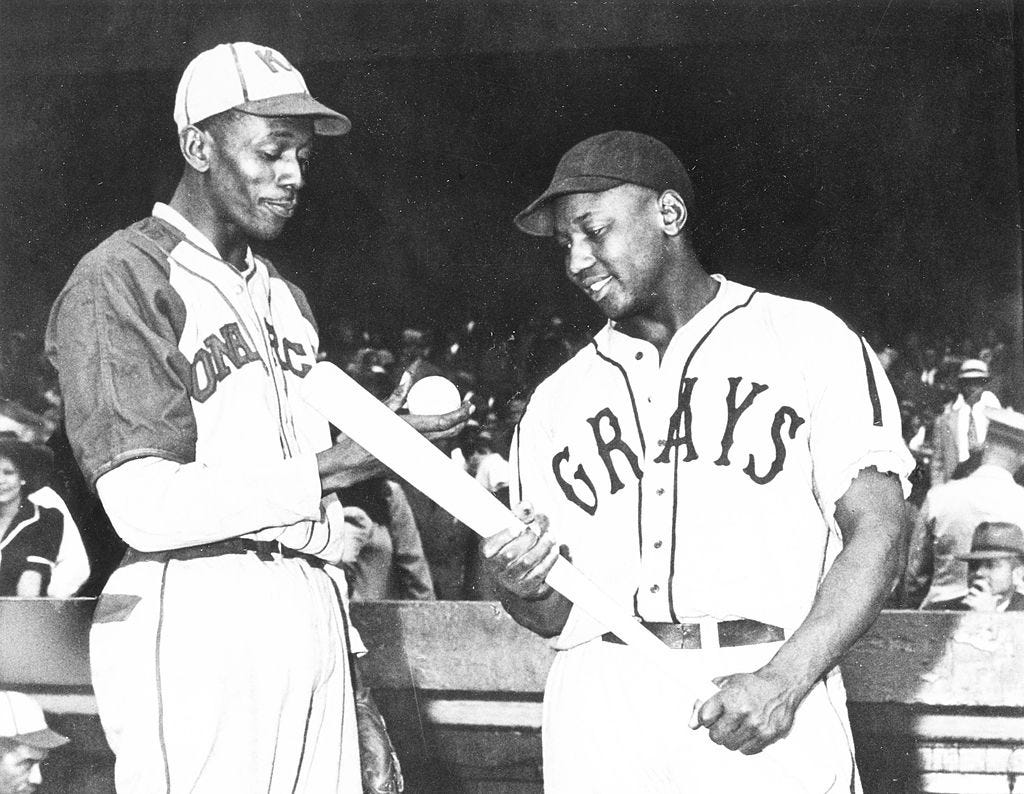
That should not be the standard going forward, of course. But it reminds us of how selective storytelling has always been. And that what is missing from the Hall is often not a result of a player’s performance, but of the choices made by those who hold the pen. So we must learn just as much from the stories we choose to tell as the ones we choose not to tell.
We also need to confront the contradictions at the heart of how we shape history. Keep in mind, there was an effort to erase aspects of Jackie Robinson’s story too, to focus only on triumph rather than the trauma and resistance he faced even after breaking the color barrier. And yet, Robinson’s story remains far more relevant and essential to the history of baseball than that of anyone who simply amassed the most of anything. His legacy was not built on numbers alone, but on character, sacrifice, and the courage to stand for something greater than personal achievement. Historical significance is not always tied to statistical supremacy.
If we are willing to leave out the most consequential players because of their immutable traits or circumstances, then we can certainly tell the stories of those who cheated the game without glorifying the inflated numbers they left behind. If players choose cheating over principled behavior, why should we preserve those records as sacred? Once we remove the awe of their statistics, what is the true, compelling story that remains?
Remember, Field of Dreams took the story of the 1919 Black Sox, the most scandalous team in baseball history, banned for throwing the World Series, and transformed it into a nostalgic, heartwarming tale about redemption, fathers and sons, and the timeless magic of the game. The film softened one of baseball’s darkest chapters, romanticizing disgraced players and recasting them not as symbols of corruption, but as ghosts yearning for a second chance. In doing so, they invited us to forgive, even forget, the seriousness of what they did for the sake of a comforting narrative.
If we choose, we can spin any story into something magical. And we also have the power to withhold that magic just as easily. We do not need any more carefully crafted redemption tours—no curated interviews, staged hitting videos, or charitable appearances designed to make us forget or to rationalize the spin while they wait for time to cushion the truth.
We are good at telling the stories we want to hear—especially the ones that end with us finishing first. We love to celebrate those at the top of the class, the ones with the biggest trophy cases. But if we fail to consider how they got there, how they earned those trophies, and how they conducted themselves while still in uniform, we risk mistaking achievement for virtue and turning numbers into idols. In doing so, we are not honoring true greatness. At its worst, we are endorsing exploitation and validating unchecked ambition. And at rock bottom, we risk enabling the very scandals we claim to condemn.
Reverence Must Be Earned
The truth is, these men are not being erased. Far from it.
Unlike so many figures from the Negro Leagues whose legacies would have vanished without the tireless efforts of advocates fighting to keep their stories alive, Bonds, Clemens, Rose, and others like them remain central to the conversation precisely because of their numbers. They may be infamous, but they are not forgotten. Many fans still revere them—especially in a sport that has a history of forgiveness.
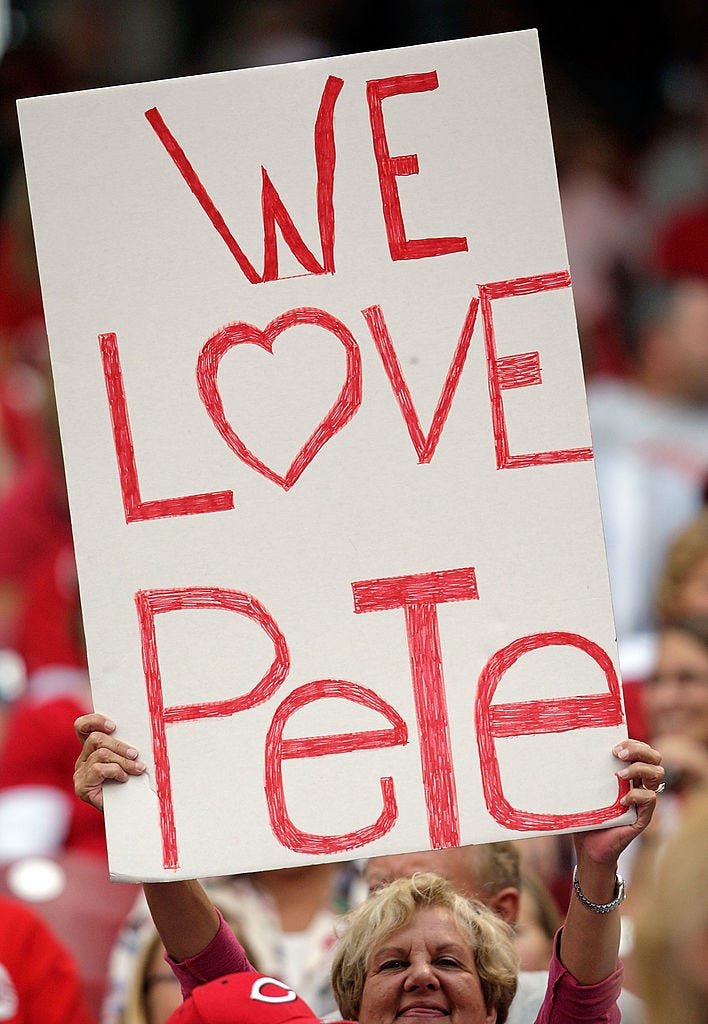
Nevertheless, every player deserves a place where he can feel accountable to a community that once stood, and still does stand, behind him. That kind of connection can foster growth for all of us. It offers a chance for reflection, and with that, the hope that something might change—not just for the player, but for the game itself. We do not owe them reverence, but we do owe ourselves honesty.
Their stories are worth remembering, not to celebrate what they compiled, but to confront what their choices reveal about the game. And about us as stewards of the game.
Too often, we place too much weight on plaques in a building. On being enshrined on a wall. We should care more about how the game was played. That powerful gold standard expectation has been both baseball’s gift and curse. Still, it is hard to ignore the feelings we had competing against, or simply watching, these game-changing players as they climbed the Top 10 ranks. Our mouths hung open in awe at the towering home runs, the defiance of age. Players often did things on the field that seemed superhuman—sometimes literally. Those feelings meant something. But, even as they gave us wonder, they stole something from us. Dulling our instincts, distracting our scrutiny, and stealing the game’s credibility in plain sight. The betrayal was not loud, and it did not come all at once. But the illusion eventually shattered, and the creeping feeling of deception filled the void. So, too, did the bitter sting when we realized we had been duped.
Because it makes us question how any player’s greatness was attained.
That lack of certainty, the pause it brings, reminds us not only of the cost of greatness when we cut corners or defy age unnaturally, but also of the lasting consequences. The lesser of those consequences is being left out of the Hall of Fame. The greater is a game that, to some, begins to feel rigged or hollow. It reminds us of the price of greed, of putting self above the game.
Damage That Outlives Us
There is a tradition of honoring the dead. We are supposed to dull our criticism and focus on the virtues of the deceased. Death does not excuse or erase, but it demands grace.
This is especially challenging when someone was an icon in an industry, a giant of a sport like Pete Rose. His legacy ripples across generations, but his scars do not magically heal just because he is gone. In baseball, what is left behind matters.
Rose’s ban may have ended with his life, but the consequences of his actions persist, shaping how it is remembered and how it is played. His death does not repair a game that was compromised. It does not restore the trust that was broken, or the innocence that was lost. Just as history cannot be rewritten to erase injustice, the game cannot be made whole simply because the person responsible is no longer here.
A player-manager like Rose, gambling on the game shifts baseball from an unscripted test of work ethic, talent and preparation into a manipulated farce. Wagering on yourself or your team is often just greed and desperation disguised as belief and faith. For a manager, preoccupation with controlling player-pawns for the outcome of a bet compromises your ability to prioritize what is best for the players, the team, and the organization. You no longer care about who is put at risk or who is set up for success. You are the opposite of a team player. You are treating each game you bet on like your own personal Game 7, not driven by your insatiable will to win, but by your relentless fear of losing a bet—something you should never have wagered in the first place.
There is a reason managers behave differently in October than they do in April. Because the stakes change. And with gambling, so does the calculus behind every decision. Who you pitch, whether you blow out your closer that day, what you do with an injury report, who you withhold, what you do with the information only you have. The danger is not hypothetical, it is real. The death threats documented in the Dowd Report make that clear.
The possibilities for manipulation are endless. And with today’s world of micro-bets, the slippery slope gets steeper. The manager becomes a threat to everyone around him. Imagine betting on a strikeout and then being in a position to pinch hit a guy because he whiffs 40% of the time. You can control every matchup. It’s too easy.
Rose served what was to be a permanent ban, and he did it without remorse, at least publicly. Now the commissioner says he has served his time—a ban limited to his lifetime.
But the impact of his choices outlives him and is felt for everyone else’s lifetimes.
The one person who could have apologized, offered peace, or taken responsibility for his choices is gone. No longer accountable. That is not justice. It is simply convenient.
Death may end punishment, but life offers a chance to make things right. Unless someone else steps in to right the wrongs in your place.
Not Every Great Story Ends In a Plaque
Every time a player retires from the game, it is a race against the inevitable. We all fade. Some stars burn longer, sustained by our desire to hold onto their warmth. But many never even had a chance to shine at all—some because the color of their skin made them invisible to the official record. The injustice lies as much in who we excluded as in who we celebrated.
We should shed no tears for greatness built on deceit. Just as we should shed no tears for someone who cared so little about the integrity of the game that he gambled it away while in uniform.
But, we should grieve for the honest player who played it straight while others cheated. We should mourn the destruction that greed left in its wake, forcing us to question the very game we love. And we should always shed a tear for those who never even had a chance to compile the numbers—because we refused to count them in the first place.
We can tell baseball’s story in many ways. These players may have been great. They may have been unforgettable. But they chose fame, money, records, and trophies. They chose to make their legacy about numbers above all else, and in doing so, they diminished what those numbers meant.
That choice carries consequences. Rose had the numbers. But what he chose to do afterwards only took away from them.
Even with record-breaking stats, the full picture matters. Their complete and truthful stories are undeniably part of baseball’s legacy and should not be ignored. These players have a place in baseball’s history, and that rightful place is within the Museum—where the full context of their accomplishments and their failures can be presented side by side.
A Hall of Fame story, however, is something more. It is not merely a ledger of records. It is a place of honor—a space reserved for those whose careers embody not only achievement, but integrity. It represents the ideals baseball aspires to, even as it often falls short. Just because a player’s story is worth telling does not mean it is worth celebrating through enshrinement. No one should back their way into baseball’s highest honor simply by elevating themselves to the top of the leaderboard.
That distinction matters. Because when we confuse documenting a story with glorifying it, we risk sending the wrong message about what greatness in this game is supposed to mean.
That is the responsibility we carry—not just to protect the numbers or the image of the game, but to protect its soul.
The permanent ban may have been lifted, but the cloud remains, and now we must be careful or the smoke could choke us.
If you or someone you know is struggling with a gambling problem, help is available. Contact the National Council on Problem Gambling at 1-800-GAMBLER or visit www.ncpgambling.org for resources and support.





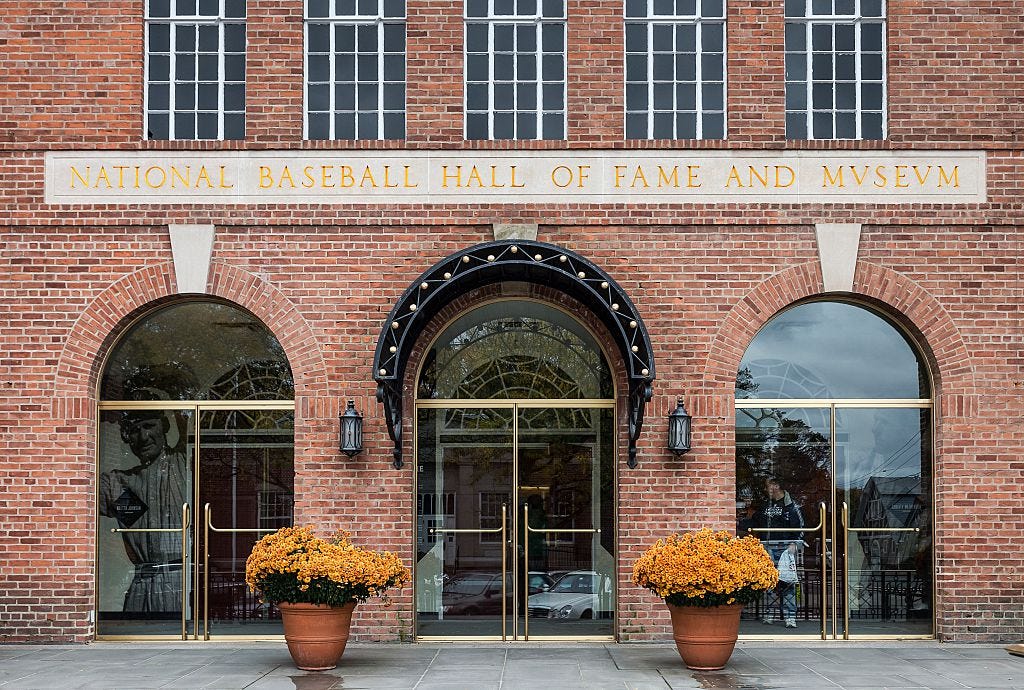
A very provocative article Doug. Coming from a former MLB player carries even more weight. Personally I've been for Rose having a plaque and that plaque noting his transgressions. But trying to write that tight copy (since there are not THAT many words on a HOF plaque) is a big challenge! So thanks for making me think about changing my mind.
His lifetime ban may have ended, but his lack of character and lack of integrity will endure forever. Thank you Doug for such an insightful article.